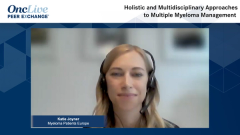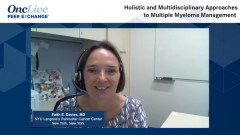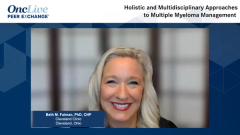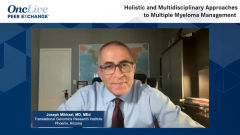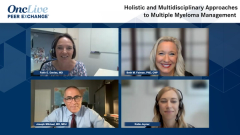
Educating on Multiple Myeloma: Patient and Physician Resources
Shared insight from key opinion leaders on educational resources made available to physicians and patients, respectively, regarding multiple myeloma management.
Episodes in this series

Transcript:
Faith E. Davies, MD: Katie mentioned something about education there, and maybe coming back to Joe…with your IMF [International Myeloma Foundation] head on, can you just explain some of the educational resources you use both for yourself to keep up-to- date, but also for patients? And then we can maybe go around the room as to what else is available.
Joseph Mikhael, MD, MEd: Oh, sure. Absolutely. Katie so beautifully put it that...this is an educational spectrum that goes from someone who doesn't have myeloma yet, to someone who's newly diagnosed with myeloma, to those of us who are caring for patients with myeloma. And...we have the privilege at the IMF, of course, of providing resources at all levels. One of the things that's really important...in this discussion around diagnosis is very much what Katie said, a deep community engagement to raise awareness of the general symptoms, especially in higher risk communities…One of the things we learned, for example, here in the US is that diabetes is a condition that often mimics myeloma. And many groups such as African Americans and Hispanic Americans [who] may have a higher incidence of diabetes, often their signs and symptoms are attributed to the diabetes, and no one thinks about another diagnosis. So, that renal insufficiency, that proteinuria, that neuropathy all gets attributed to the diabetes…
So, at the IMF, we do a lot of programs, including our M-Power project that is…nested in the community, partnering with multiple community groups, to raise general awareness, but…to do the very thing that Katie mentioned, which was encourage people to see their provider, see if they do need to be tested. And then once someone has the diagnosis... we, through our info line and through myeloma.org, and multiple other educational programs, try to educate patients. At the very start, I just did a Facebook Live [and] we called it, “Ask Dr Joe Anything”. We had several patients who were actually diagnosed in the last few weeks...[We tried] to try and educate them, give them that resource, help them find a support group, help them find those resources. And then on the other end of the spectrum, I know to provide the providers, as Beth does so beautifully through a nurse leadership board, but also to those…physician providers who are caring for patients to [help them] know, what is the latest in myeloma? Most patients of myeloma are still cared for by someone who spends…less than 5% of their time [treating] myeloma. They're taking care of all these other tumors. So, it's really incumbent on us to provide education that's clear and supportive and helpful so that they can care for that myeloma patient [who] they don't see that frequently.
Faith E. Davies, MD: I completely agree. I find the International Myeloma Working Group guidelines really helpful, particularly recently with the changes between our criteria for MGUS, smoldering myeloma, and when we should start treatment and so on. Beth, from a nursing perspective…where do you tend to suggest people look for their…education?
Beth M. Faiman, PhD, CNP: So...the education comes from the providers first, but there are so many support groups out there. Now, what we're seeing is in the media [platforms]—we have…the Facebook support groups, Instagram, there [are] WhatsApp support groups—there [are] so many different outlets globally where patients can access and connect with others. So, I try to be very careful about recommending…those types of outlets. But the IMF [and] the MMRF in the United States do a great job. Myeloma Canada has a wealth of resources, as well as Myeloma UK [and] Myeloma Europe. And so, I will just look at the geography of where that patient is located for specific resources and try to link them into support groups as well.
Faith E. Davies, MD: Excellent. Katie, anything you want to add?
Katie Joyner: Yes, [it’s] similar on the NP side…just making sure that we have a variety of resources available and patient-friendly language and lay language and mediums that patients want. Some want really in-depth...long-form Q&As or fact sheets, others want short videos. And for us, a big effort is put towards translations and making sure that things are adapted locally for the countries that we represent, because not all the information...will be available or patients [won’t] be able to understand everything in English. And it's really important that it's adapted for local...verbiage and things like that.
And then on the clinician side, similar to what Joe was saying ...having ongoing educational materials available for GPs and other specialists. We have recently developed a diagnosis pathway that we can distribute among GPs and related specialists to help them recognize the signs and symptoms and test more quickly. And also getting that translated and adapted nationally is quite important, as well as opportunities to educate GPs. So, one of the things we heard in our research was patient organizations and hematologists attending GP congresses and other events where they have an opportunity to speak about myeloma and raise awareness amongst the professionals who will first encounter it for patients. So...there's [obviously not a] one-size-fits-all approach. There's got to be a lot of different avenues and it's great to see...between all the different patient organizations that Beth just mentioned, there [are] so many resources out there now for patients and for providers.
Faith E. Davies, MD: Fantastic.
Transcript is AI-generated and edited for clarity and readability.


